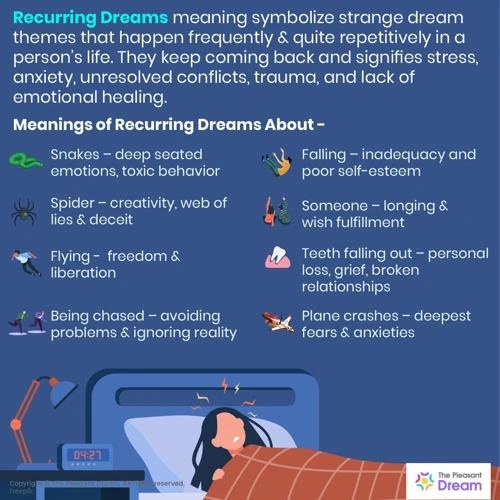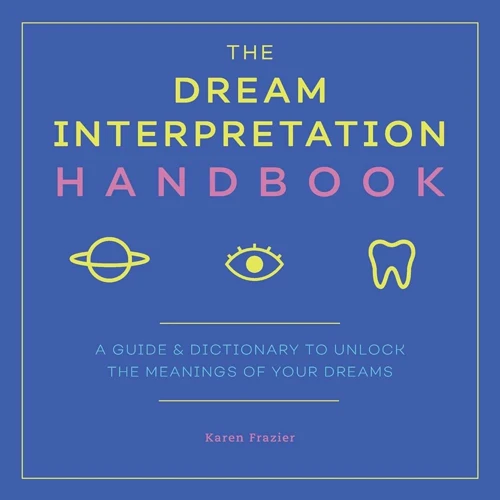It’s a mysterious phenomenon that continues to baffle and mesmerize: recurring dreams. These enigmatic visions that play on loop in our subconscious mind can leave us feeling perplexed and curious about their underlying meaning. Why do they keep coming back, night after night, week after week? In this article, we will delve into the fascinating world of recurring dreams, exploring the reasons behind their recurrence and the potential significance of their symbolism. Join us on this journey as we unravel the secrets of our nocturnal mindscapes and learn how to navigate the depths of our dreamscape terrain.
What are Recurring Dreams?

Recurring dreams are a unique and captivating aspect of our dreaming experience. These are dreams that repeat themselves over a period of time, often with similar themes, settings, or events. They have a way of capturing our attention and making us wonder about their significance. While some may dismiss them as mere coincidences, recurring dreams are believed to hold deeper meanings and insights into our subconscious mind. They can occur once every few days or even span over several years, leaving us intrigued and searching for answers. These dreams may come in various forms, such as recurring nightmares or recurring pleasant dreams, each holding their own messages and interpretations. Many individuals report having recurring dreams that revolve around unresolved issues, emotional stress, or buried memories. Additionally, recurring dreams can also be seen as opportunities for personal growth and self-reflection, offering a doorway to explore our innermost thoughts and emotions. So, what exactly are the reasons behind these recurring dreams? Let’s explore further to uncover the mysteries that lie within our restless slumber.
Reasons for Recurring Dreams

Recurring dreams can have various underlying reasons that contribute to their persistent nature. These dreams often serve as a reflection of our inner struggles, emotions, and past experiences. Here are three common reasons for recurring dreams:
1. Unresolved Issues or Trauma: Recurring dreams may emerge as a result of unresolved conflicts or traumatic experiences in our lives. The mind uses these repetitive dreams as a way to process and attempt to find resolution for these lingering issues.
2. Emotional Stress or Anxiety: Experiencing recurring dreams can be a sign of heightened emotional stress or anxiety. Our subconscious mind manifests these fears and worries in our dreams, creating a repetitive cycle that seeks to address and alleviate these emotional burdens.
3. Deeply Buried Memories: Recurring dreams often resurface buried memories or forgotten events from our past. These dreams serve as a way for our subconscious mind to bring attention to unresolved feelings or memories that have been tucked away, begging for resolution or healing.
Understanding the reasons behind recurring dreams provides us with valuable insights into our own psyche and can be a catalyst for personal growth and self-reflection. By exploring these dreams, we can gain a deeper understanding of ourselves and our emotions. If you’re interested in tips on how to break the cycle of recurring dreams, you can check out our article on how to stop recurring dreams for some helpful strategies.
1. Unresolved Issues or Trauma
Unresolved issues or trauma are often at the heart of recurring dreams. Our dreams can serve as a platform for our subconscious mind to work through unresolved emotions, experiences, or conflicts that we have not fully processed in our waking life. These dreams act as a reflection of the inner turmoil or unresolved issues that continue to linger within us. They may replay scenarios, events, or people from our past, bringing forth emotions and memories that we may have suppressed or ignored. These recurring dreams can be an indication that we need to confront and address these unresolved issues in order to find healing and closure. It’s important to remember that recurring dreams are not meant to torment us, but rather to nudge us towards personal growth and self-discovery. By acknowledging and exploring the unresolved issues or trauma present in these dreams, we can embark on a journey of healing and transformation. If you find yourself constantly grappling with recurring dreams related to unresolved issues or trauma, it may be beneficial to seek the assistance of a professional therapist or counselor, who can provide guidance and support in navigating through these complex emotions. Understanding the connection between recurring dreams and personal growth is key to unraveling the profound messages they hold.
2. Emotional Stress or Anxiety
Emotional stress and anxiety are common factors that can contribute to the occurrence of recurring dreams. When we experience high levels of stress or anxiety in our waking life, our subconscious mind may use dreams as a way to process and cope with these emotions. These dreams often manifest as scenarios or situations that reflect our underlying fears or worries. For example, someone who is undergoing financial difficulties may have recurring dreams of being chased by debt collectors or losing their possessions. The intensity of the emotions can create a loop where the same dream keeps resurfacing, attempting to address and resolve these underlying issues. Recurring dreams driven by emotional stress or anxiety can serve as a signal for us to pay attention to our mental and emotional well-being. They encourage us to find healthy coping mechanisms, such as seeking support from loved ones or engaging in stress-reducing activities like exercise or meditation. By addressing and alleviating the source of emotional stress or anxiety, we can potentially break the cycle of recurring dreams and promote a sense of personal growth and inner peace. To learn more about the connection between recurring dreams and personal growth, check out our previous article on the connection between recurring dreams and personal growth.
3. Deeply Buried Memories
Deeply buried memories play a significant role in the occurrence of recurring dreams. Our minds have a fascinating capacity to store memories, experiences, and emotions, sometimes in the depths of our subconscious. These memories can resurface in our dreams, especially when they remain unresolved or unaddressed in our waking lives. In some instances, these buried memories may be traumatic experiences that our minds have tried to repress. The subconscious mind, through recurring dreams, attempts to bring these memories to our conscious awareness, urging us to confront and process them. This process of reliving buried memories in our dreams can be both unsettling and therapeutic, as it allows us to explore and release deep-seated emotions that may have been long suppressed. By addressing these buried memories, we have an opportunity for healing and personal growth. Psychoanalysis and therapy can be valuable resources in navigating and interpreting the symbolism behind these dreams, providing insights into the underlying causes and connections to our waking life experiences. So, if you find yourself experiencing recurring dreams that seem connected to deeply buried memories, it may be beneficial to seek professional guidance to aid in your understanding and healing process.
Exploring the Symbolism

Exploring the symbolism of recurring dreams can unveil a rich and intricate tapestry of hidden meanings and messages. Symbols in dreams serve as a powerful medium for our subconscious mind to communicate with us, often reflecting our deepest fears, desires, and unresolved conflicts. There are three main categories of symbols that may appear in recurring dreams: common symbols, personalized symbols, and archetypal symbols. Common symbols are widely recognized and have shared meanings, like water representing emotions or falling symbolizing a loss of control. Personalized symbols are unique to the individual and may hold personal significance based on their experiences and memories. Archetypal symbols, on the other hand, tap into the collective unconscious and carry universal meanings, such as the shadow representing our hidden fears or the wise old man personifying wisdom and guidance. By closely examining and decoding these symbols, we can gain a deeper understanding of ourselves and the recurring themes that persist in our dreams. To learn more about the intricate world of dream symbolism and its implications in psychoanalysis, visit our article on the psychoanalytical interpretation of dreams.
1. Common Symbols
Common symbols are prevalent in recurring dreams and often hold significant meaning. These symbols can vary from person to person, but there are some that tend to be more universal in their interpretation. One common symbol is water, which can represent emotions, transformation, or the subconscious mind. Another common symbol is the presence of a bridge, which often signifies transitions or a connection between two different aspects of life. Animals, such as snakes or spiders, are also frequently encountered symbols that can represent fear, hidden desires, or transformation. Additionally, being chased in a dream is a commonly reported symbol that represents avoidance or fear of confrontation. These symbols can serve as valuable clues in understanding the underlying messages of recurring dreams. It is important to remember that the interpretation of these symbols may vary based on individual experiences and personal associations. So, pay attention to these recurring symbols and contemplate their significance to gain deeper insights into your own subconscious mind.
2. Personalized Symbols
Personalized symbols in recurring dreams are unique to each individual, stemming from their personal experiences, memories, and emotions. These symbols often hold deep significance and meaning that may not be immediately apparent to anyone else. They are the language of the subconscious mind, communicating with us through imagery and metaphors that we can understand on a personal level. These symbols can take various forms, such as specific objects, people, or places that hold personal significance to the dreamer. For example, a red rose may symbolize love and passion for one person, while it may represent loss and mourning for another. The meaning of these personalized symbols can only be deciphered by delving into the dreamer’s unique life experiences and emotions. To uncover the meaning behind these symbols, it is crucial to engage in self-reflection and introspection. By analyzing our own associations and emotions connected to these symbols, we can gain valuable insights into our inner selves. This exploration can lead to a deeper understanding of our fears, desires, and unresolved issues, offering us an opportunity for personal growth and self-discovery. So, the next time you encounter a personalized symbol in a recurring dream, take this as a sign to delve deeper into your own psyche and unlock the hidden treasures within.
3. Archetypal Symbols
Archetypal symbols in recurring dreams are those that carry universal meanings and are shared across cultures and civilizations. These symbols are deeply ingrained in our collective unconscious and tap into our primal instincts and experiences. They often represent fundamental human themes and serve as a bridge to our deepest fears, desires, and aspirations. Examples of archetypal symbols that commonly appear in recurring dreams include the shadow, the hero, the trickster, and the wise old man or woman. The shadow represents the darker aspects of our psyche, the repressed or unconscious parts that we may be reluctant to acknowledge. The hero symbolizes triumph over adversity and the journey towards self-discovery and personal growth. The trickster represents chaos and unpredictability, reminding us to embrace spontaneity and playfulness in life. The wise old man or woman embodies wisdom, guidance, and the knowledge passed down through generations. When these archetypal symbols appear in our recurring dreams, they serve as powerful messengers and invite us to explore the deeper layers of our own psyche. Understanding and interpreting these symbols can provide valuable insights into our own inner conflicts, aspirations, and paths to self-actualization.
Interpreting Recurring Dreams

Interpreting recurring dreams can provide valuable insights into our subconscious mind and help us gain a deeper understanding of ourselves. There are several strategies we can employ to decode the symbolism and meaning behind these recurrent visions. Keeping a dream journal is a powerful tool that allows us to document and analyze our dreams, looking for patterns and recurring themes. This practice helps us uncover hidden messages and identify any underlying emotions or unresolved issues. Analyzing patterns and themes is another approach, where we observe common elements or scenarios present in our recurring dreams. By identifying these recurring motifs, we can begin to unravel the symbolic meanings they hold. Seeking professional guidance from therapists or dream analysts can also be beneficial for those struggling to interpret their recurring dreams. These experts can provide valuable insights and interpretations based on their expertise and experience in dream analysis. Ultimately, the key to interpreting recurring dreams lies in our willingness to delve into the depths of our subconscious and explore the rich symbolism that unfolds within our nocturnal adventures.
1. Keep a Dream Journal
Keeping a dream journal is a powerful tool for interpreting and understanding recurring dreams. When we wake up from a dream, our memories of it can quickly fade away. By writing down our dreams in a journal, we can capture the details and emotions while they are still fresh in our minds. This practice allows us to revisit and analyze our dreams later on. When dealing with recurring dreams, it is crucial to track any patterns, similarities, or recurring symbols that appear across different dream instances. By documenting these recurring elements, we can gain insight into the underlying message or theme that our subconscious is trying to convey. Additionally, keeping a dream journal helps in recognizing any progress or changes in our dreams over time. Regularly documenting our dreams can also enhance our dream recall abilities and make it easier to identify recurring patterns. The dream journal can be a simple notebook beside the bed or a dedicated app on your phone, as long as it’s easily accessible upon waking. So, start keeping a dream journal today and unlock the gateway to understanding the meaning behind your recurring dreams.
2. Analyze Patterns and Themes
Analyzing patterns and themes in recurring dreams can provide valuable insights into their meaning and significance. By carefully examining the recurring elements, symbols, emotions, and events that occur in your dreams, you can start to identify common threads and recurring motifs. Creating a dream journal can be a helpful tool in this process. Take note of the details of each dream, including the setting, characters, objects, and any emotions or sensations experienced. Look for patterns that emerge across multiple dreams, such as recurring symbols or situations. Is there a specific location that appears frequently? Do certain emotions or feelings accompany these dreams? Are there any recurring actions or events? By analyzing these patterns, you can begin to unravel the underlying themes that connect your recurring dreams. This can provide valuable clues about the unresolved issues, emotions, or experiences that your subconscious mind is attempting to process. It’s important to approach this analysis with an open mind and without rigid interpretations. Each individual’s dreams are unique, and the symbolism may be deeply personal. Using tools like dream dictionaries or symbolism guides can be helpful, but remember that the most meaningful interpretations will come from your own intuition and personal associations. By taking the time to analyze patterns and themes, you can deepen your understanding of your recurring dreams and gain greater insight into your inner world.
3. Seek Professional Guidance
Seeking professional guidance can be a valuable step in understanding and interpreting recurring dreams. While exploring the symbolism and analyzing patterns on your own can provide insight, a trained professional can offer a fresh perspective and professional expertise. Consulting with a therapist or dream analyst who specializes in dream interpretation can help uncover the underlying meanings and provide guidance on how to address any unresolved issues or emotions present in the dreams. These professionals have the knowledge and experience to help you navigate the complexities of your recurring dreams and provide personalized interpretations based on your unique experiences and emotions. They can assist in identifying recurring themes, uncovering repressed memories, and offering therapeutic techniques to help you process and make sense of your dreams. Additionally, discussing your recurring dreams with a professional can provide a safe and supportive space to explore any underlying psychological or emotional issues that may be connected to the dreams. Remember, seeking professional guidance can be an important step towards finding clarity and finding ways to work through the emotions and messages brought forth by your recurring dreams.
Tips to Cope with Recurring Dreams
Coping with recurring dreams can be challenging, but there are various strategies that can help alleviate their impact on our daily lives. One effective approach is to practice relaxation techniques, such as deep breathing, meditation, or progressive muscle relaxation, before going to bed. These methods can help calm the mind and promote a sense of tranquility, making it easier to fall asleep and potentially reducing the occurrence of recurring dreams. Engaging in self-reflection is another valuable tool, as it allows us to explore the underlying emotions and thoughts that may be triggering the dreams. By journaling or talking with a trusted friend or therapist, we can gain insights into our subconscious mind and address any unresolved issues. Creating a positive sleep environment is also crucial, involving factors such as a comfortable mattress, soothing colors, and a clutter-free space. Additionally, establishing a consistent bedtime routine and practicing good sleep hygiene can contribute to a more restful sleep, potentially reducing the frequency or intensity of recurring dreams. With these coping mechanisms in place, we can navigate the realm of recurring dreams with greater ease and find solace in achieving a peaceful night’s rest.
1. Practice Relaxation Techniques
When it comes to coping with recurring dreams, practicing relaxation techniques can be incredibly beneficial. Here are a few techniques that can help calm the mind and promote a more peaceful sleep:
1. Deep Breathing: Deep breathing exercises can help relax the body and reduce stress. Take slow, deep breaths in through the nose and out through the mouth, focusing on the sensation of the breath filling and leaving the body. This technique can be particularly helpful in calming the mind before bedtime.
2. Progressive Muscle Relaxation: This technique involves systematically tensing and then releasing each muscle group in the body. Starting from the toes and working all the way up to the head, tense each muscle group for a few seconds, then release the tension while focusing on the sensation of relaxation. This practice can help promote overall relaxation and alleviate tension before sleep.
3. Guided Visualization: Guided visualization involves imagining a peaceful and calming scenario to create a sense of relaxation. This could be picturing oneself in a serene natural setting or engaging in an enjoyable activity. The key is to use all the senses to make the visualization as vivid as possible, focusing on the details and allowing the mind to wander into a state of tranquility.
4. Meditation: Regular meditation practice can help calm the mind, reduce stress, and promote deep relaxation. Find a quiet and comfortable space, close your eyes, and focus on your breath or a soothing mantra. Allow any thoughts or emotions to pass by without judgment, simply observing them and gently returning to the point of focus. Even just a few minutes of daily meditation can make a significant difference in managing recurring dreams.
By incorporating these relaxation techniques into your daily routine, you can create a more peaceful and restful sleep environment, reducing the likelihood of recurring dreams and promoting overall well-being. So, take some time for self-care and discover the power of relaxation in breaking the cycle of persistent dreaming.
2. Engage in Self-Reflection
Engaging in self-reflection is a powerful tool when it comes to coping with recurring dreams. By examining our thoughts, emotions, and experiences, we can gain a deeper understanding of the underlying causes and messages behind these dreams. Here are a few ways to engage in self-reflection:
1. Journaling: Start a dream journal and record your recurring dreams in detail. Take note of any patterns, symbols, or emotions that stand out to you. Reflect on these elements and connect them to your waking life. This process can provide valuable insights into the themes and challenges you may be facing.
2. Questioning: Ask yourself probing questions about the recurring dream. What emotions does it evoke? Are there any unresolved issues in your life that relate to the dream? By digging deep and examining the dream from different angles, you can uncover hidden meanings and gain clarity.
3. Meditation and Mindfulness: Set aside some quiet time for meditation or mindfulness practices. These techniques can help you quiet your mind and allow your subconscious thoughts to surface. Pay attention to any recurring thoughts or images that arise during these practices, as they may offer insights into your recurring dreams.
4. Seeking Inner Guidance: Consider using creative techniques like drawing, painting, or writing to connect with your inner self. Expressing your emotions and experiences through art can be a cathartic process that allows you to tap into your subconscious and gain a deeper understanding of your recurring dreams.
Engaging in self-reflection requires patience and an open mind. By delving into your inner thoughts and experiences, you can unlock the mysteries of your recurring dreams and find meaning and healing along the way. Remember, self-reflection is a personal journey, and the insights gained from it are unique to each individual. So, embrace the process and let it guide you towards a greater understanding of yourself and your recurring dreams.
3. Create a Positive Sleep Environment
3. Create a Positive Sleep Environment
Creating a positive sleep environment is essential for ensuring a restful night’s sleep and minimizing the occurrence of recurring dreams. Our sleep environment plays a crucial role in the quality of our sleep and the state of our subconscious mind. Here are some tips to help you create a positive sleep environment:
1. Optimize Comfort: Make sure your bedroom is comfortable and conducive to sleep. Invest in a comfortable mattress, pillows, and bedding. Keep the temperature cool and regulate the lighting to create a relaxing ambiance.
2. Reduce Noise: Eliminate or minimize disruptive noises that can interrupt your sleep and trigger unsettling dreams. Use earplugs, a white noise machine, or soft background music to drown out any disturbing sounds.
3. Declutter Your Space: A clutter-free bedroom can promote a sense of calm and peace. Clear away any unnecessary items or distractions that may create mental clutter and affect your sleep quality.
4. Create a Relaxing Routine: Establish a pre-sleep routine that helps you unwind and relax before bed. Engage in activities that promote relaxation, such as reading a book, practicing deep breathing exercises, or listening to soothing music.
5. Limit Electronic Devices: Reduce your exposure to electronic devices, such as smartphones, tablets, and laptops, before bedtime. The blue light emitted by these devices can interfere with your sleep patterns and increase the likelihood of vivid and disruptive dreams.
By creating a positive sleep environment, you can increase your chances of experiencing more peaceful and restorative sleep. This, in turn, can help minimize the occurrence of recurring dreams and promote overall well-being. So, take the time to optimize your sleep environment and prioritize a good night’s rest.
Conclusion
In conclusion, recurring dreams are a fascinating phenomenon that can provide valuable insights into our subconscious mind. These dreams often signal unresolved issues, emotional stress, or deeply buried memories that our subconscious is trying to bring to our attention. By exploring the symbolism within recurring dreams, we can gain a better understanding of ourselves and our emotions. Keeping a dream journal, analyzing patterns and themes, and seeking professional guidance are all effective ways to interpret and make sense of these dreams. Coping with recurring dreams involves practicing relaxation techniques, engaging in self-reflection, and creating a positive sleep environment. While the exact meaning and interpretation of recurring dreams may vary from person to person, they serve as access points to our inner world and offer opportunities for personal growth and self-discovery. So, the next time you find yourself trapped in the repetitions of a recurring dream, embrace the journey it offers and let it guide you towards a deeper understanding of yourself and your subconscious mind.
Frequently Asked Questions
1. Can recurring dreams have different meanings each time they occur?
Yes, recurring dreams can have different meanings each time they occur. Our dreams are influenced by various factors, such as our current emotions, experiences, and subconscious thoughts. As these factors change over time, the interpretation of recurring dreams may also evolve.
2. Are recurring dreams always connected to unresolved issues?
Not necessarily. While recurring dreams can be connected to unresolved issues or trauma, they can also stem from other sources such as emotional stress, anxiety, or deeply buried memories. It’s important to explore the context and emotions surrounding the dream to gain a deeper understanding.
3. Do recurring dreams always contain symbolism?
Recurring dreams often contain symbolism, but not all of them do. Some recurring dreams may consist of literal representations of our thoughts and experiences, while others may incorporate more subtle symbolic elements. It’s important to analyze the specific symbols within the context of the dream.
4. Can recurring dreams be a sign of personal growth?
Yes, recurring dreams can be a sign of personal growth. They can serve as a subconscious way of working through unresolved issues or emotions, allowing for personal reflection and growth. These dreams can offer valuable insights into our inner selves and provide opportunities for self-discovery.
5. How can keeping a dream journal help interpret recurring dreams?
Keeping a dream journal allows you to record and reflect on the details of your recurring dreams. By documenting the themes, symbols, and emotions present in each dream, you can start to identify patterns and gain a deeper understanding of their meaning over time.
6. What techniques can help cope with the emotional impact of recurring nightmares?
Several techniques can help cope with the emotional impact of recurring nightmares. These include practicing relaxation techniques such as deep breathing or meditation before sleep, engaging in positive affirmations, creating a calming sleep environment, and seeking support from a therapist or counselor if needed.
7. Are there any benefits to analyzing recurring dreams?
Yes, analyzing recurring dreams can have several benefits. It can provide valuable insights into our unconscious mind, help identify unresolved issues or emotions, offer an opportunity for self-reflection and personal growth, and potentially lead to a better understanding of ourselves and our desires.
8. How can seeking professional guidance assist in interpreting recurring dreams?
Seeking professional guidance, such as consulting with a therapist or dream analyst, can provide a deeper understanding and interpretation of recurring dreams. These experts have knowledge and experience in dream analysis and can help uncover underlying meanings or patterns that may not be readily apparent.
9. Can recurring dreams be a sign of suppressed or forgotten memories?
Yes, recurring dreams can sometimes be a sign of suppressed or forgotten memories. Our dreams have the ability to access deep-seated thoughts and emotions that may be hidden from our conscious mind. Paying attention to recurring dreams can potentially help recover and process these buried memories.
10. Should recurring dreams be interpreted literally or symbolically?
Interpreting recurring dreams can be a combination of both literal and symbolic analysis. It’s important to consider the context, emotions, and personal experiences associated with each dream. While some elements may have literal meanings, others may require a more symbolic interpretation to grasp their deeper significance.








